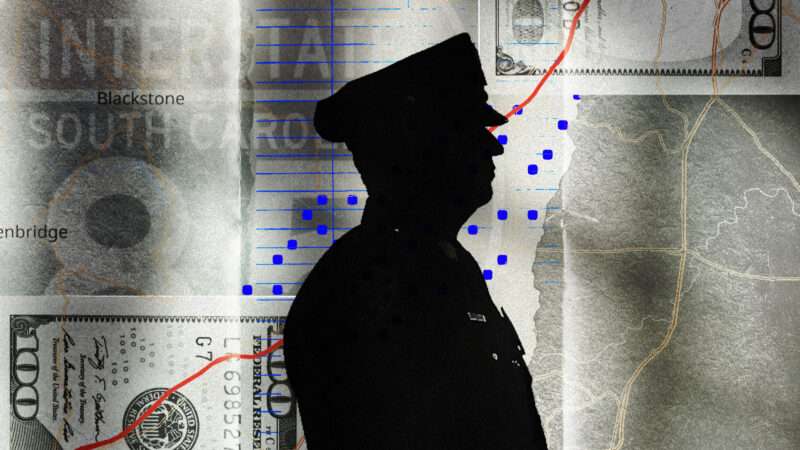Operation Rolling Thunder: The Shocking Truth Behind Spartanburg's Traffic Stops

In Spartanburg County, South Carolina, on Interstate 85, police officers stop vehicles for traveling in the left lane while not actively passing, touching the white fog line, or following too closely. This annual crackdown is called Operation Rolling Thunder, and the police demand perfection.
Any infraction, no matter how minor, can lead to a roadside interrogation and warrantless search. However, a 21-month fight for transparency shows participating agencies play loose with South Carolina's Freedom of Information Act (FOIA), which requires the government to perform its business in an "open and public manner."
Motorists must follow state laws with exactness. But the people in charge of enforcement give themselves a pass.
Deny, Deny, Deny
The drawn-out FOIA dispute started on October 11, 2022, less than one week after a five-day blitz that produced nearly $1 million in cash seizures. Our public-interest law firm, the Institute for Justice, requested access to incident reports for all 144 vehicle searches that occurred during the joint operation involving 11 agencies: The Cherokee, Florence, Greenville, and Spartanburg County sheriff's offices; the Duncan, Gaffney, and Wellford police departments; the South Carolina Highway Patrol, Law Enforcement Division, and State Transport Police; and the U.S. Department of Homeland Security.
Our intent was simple. We wanted to check for constitutional violations, which can multiply in the rush to pull over and search as many vehicles as possible within a set time frame. South Carolina agencies have conducted the operation every year since 2006, yet no one has ever done a systematic audit.
Rather than comply with its FOIA obligation, Spartanburg County denied our request without citing any provision in the law. We tried again and then recruited the help of South Carolina resident and attorney Adrianne Turner, who filed a third request in 2023.
It took a lawsuit to finally pry the records loose. Turner filed the special action with outside representation.
Key Findings
The incident reports, released in batches from March through July 2024, show why Spartanburg County was eager to prevent anyone from obtaining them.
- Over 72 percent of vehicle searches during Operation Rolling Thunder in 2022 produced nothing illegal. Officers routinely treated innocent drivers like criminals.
- Carrying any amount of cash is legal, but officers treated currency as contraband. The records describe no single case in which officers found a large amount of cash and did not seize it. All money was presumed dirty.
- Officers pressured property owners to sign roadside abandonment forms, giving up claims to their cash on the spot.
- South Carolina residents mostly got a pass. Officers focused on vehicles with out-of-state plates, rental cars, and commercial buses. Over 83 percent of the criminal suspects identified during warrantless searches lived out of state. Nearly half were from Georgia.
- Black travelers were especially vulnerable. Nearly 74 percent of the suspects identified and 75 percent of the people arrested were black. This is more than triple the South Carolina black population of 25 percent.
Working in the Shadows
While these records shine a light on police conduct, still more secrets remain.
By policy, the Spartanburg County Sheriff's Office and partner agencies do not create incident reports for every search. They only document their "wins" when they find cash or contraband. They do not document their "losses" when they come up empty.
Thanks to this policy, Spartanburg County has no records for 102 of the 144 searches that occurred during Operation Rolling Thunder in 2022. Nowhere do officers describe how they gained probable cause to enter the vehicles where nothing was found. The police open and close investigations and then act like the searches never happened.
This leaves government watchdogs in the dark—by design. They cannot inspect public records that do not exist. Victims cannot cite them in litigation. And police supervisors cannot review them when evaluating job performance.
Even if body camera video exists, there is no paper trail. This lack of recordkeeping undercuts the intent of FOIA. Agencies dodge accountability by simply not summarizing their embarrassing or potentially unconstitutional conduct.
The rigged system is rife with abuse. Available records show that officers routinely order drivers to exit their vehicles and sit in the front seat of a patrol car. If people show signs of "labored breathing," "nervousness," or being "visibly shaken," the police count this toward probable cause.
Officers overlook that anxiety is normal when trapped in a police cruiser without permission to leave. Even people who value their Fourth Amendment right to be "secure in their persons, houses, papers, and effects, against unreasonable searches and seizures" can break under pressure and consent to a search.
If travelers refuse, officers can bring K9 units to the scene for open-air sniffs. Having no drugs in the vehicle does not always help. False positives occurred during Operation Rolling Thunder, but the lack of recordkeeping makes a complete audit impossible.
Intimidation, harassment, and misjudgment are easily hidden. The police tell travelers: "If you have nothing to hide, you should let us search." But when the roles are reversed and the public asks questions, agencies suddenly want to remain silent.
The post Operation Rolling Thunder: The Shocking Truth Behind Spartanburg's Traffic Stops appeared first on Reason.com.



